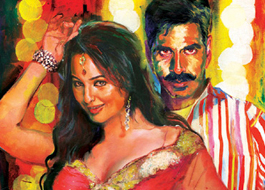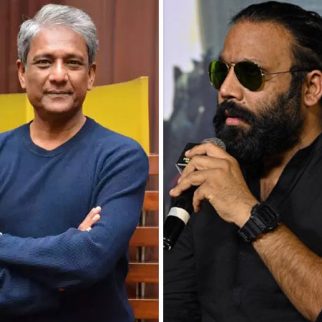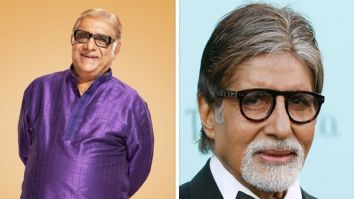
The Rajya Sabha (RS) yesterday passed the much talked about bill amending Copyright laws in the country. Some of the core points reflected in the Copyright Amendment Bill include the right of author and music composer, right to the visually impaired, extending compulsory regime to unpublished work and imposition of punitive actions. For a while now, noted lyricist-writer Javed Akhtar had been fighting for the rights of writers, lyricists, singers and composers so that these artistes get a fair share in revenue in the form of royalties from music companies and production houses. The bill got passed with support from RS member Jaya Bachchan, BJP's Arun Jaitley, Congress's Kapil Sibal and Left members.
While the singers, composers and lyricists seem to be rejoicing at the new amendments, the music companies are not too happy with the amendments made in the copyright bill. Lot of the music companies feel that they have got a raw deal with respect to royalty as well as statutory licensing. Speaking about this Neeraj Kalyan, President of T-Series, said, "The amendment in the copyright act could have been a welcome step if the filmmaker's representations were heard. It seems obvious here that most of the arguments of filmmakers have not been considered and dealt with. The filmmakers have not objected to the rightful share of the authors at all. We are in fact, committed to work out a win-win model for the authors, ensuring that their work is protected and monetized so that the authors receive royalties during the entire life span of the rights but it is extremely unfortunate that with the process followed for amending of the existing copyright bill, the film producers are feeling marginalized."
One of the main complaints of the music companies has been with amendments made in Section 31D which deals with statutory licensing for broadcasting of literary works, musical works and sound recordings. While, the amendments on one side is ensuring royalties for the authors but on the other side the bill is restricting revenues for filmmakers and authors by imposing Statutory Licensing to the broadcasting sector which companies feel is unfair. Shedding light on this grave issue, Neeraj Kalyan said, "This regulation imposed in the proposed amendment bill will take away the freedom of the content owner's to trade. It means that the content owners will have no option then to license music rights to the broadcasters. Till recently, the statutory licensing was limited to the Government owned networks (namely AIR & Doordarshan), however, post these changes, even the private broadcasting networks are treated on par with the Government owned networks. Unlike the past, the Broadcasting sector in India now is owned, managed and controlled by large media conglomerates with cross holdings by profit making bodies wanting to enlarge their profits at the cost of survival of authors, composers, producers and music labels. The broadcasters may therefore exploit the provisions of this new section 31D to avoid freely negotiated voluntary license arrangements thereby causing unprecedented losses to the Film & Music industry, whereas the same broadcasters are free to charge advertising rates at their own will depending upon their TRP / RAM ratings. It will grossly disturb the equilibrium in favour of such broadcaster who would disturb the competitive market and abuse the process of law for indirect subsidies through the Copyright Board while there is no control over costs incurred in producing or acquiring copyrights by Film & Music industry. The Govt by bringing this Amendment intends to control and squeeze the revenue pipe of film & music industry to favour already profitable broadcasters. This unconsidered intervention by State in existing free market arrangements and free market structures will have highly unpredictable negative consequences for film & music industry."
Kalyan further added, "Though the Government has made amendments to the copyright act on the pretext of the laws prevailing in other countries, however, as far we are aware that the statutory licensing regime is not applicable in any other country and thus why only Indian Govt. is so keen on this draconian provision which will take away our right to negotiate a fair license fee for our copyrighted works. We appreciate that the copyright laws balances the rights of public at large to have access to such works that have been circulated in public. But if the provisions of statutory licensing are passed as proposed the entire concept of exclusivity of control of copyright in the owner/author as guaranteed by the act shall be defeated and the economic rights that it seeks to provide shall be unfairly withdrawn. Statutory Licensing is to Copyright what Emergency or Martial Law is to Democracy."
Meanwhile the International Federation of the Phonographic Industry (IFPI) which represents the recording industry worldwide, with over 1400 members from 66 countries also seems unhappy with amendments made in Section 31D relating to statutory licensing. An official press release sent by the IFPI states, "We have grave concerns regarding the proposal for a compulsory license for broadcasters (Section 31D of the proposed amendments to India's copyright law). This proposal is unprecedented, and conflicts with the exclusive rights granted to creators in India. It could also find India in breach of its international obligations, as it represents an overly broad limitation on exclusive rights. The reason for this major change in India's approach to the rights of producers and other creators is unclear. Existing law has worked well for many years and the major shift in India's approach to the nature of producers' broadcasting rights is unexplained. The statutory license would diminish the exclusive nature of the broadcasting right, turning it into a mere right to receive royalties. This would not only negatively impact on creators' ability to negotiate license terms with broadcasters, but also cause significant losses to rightholders in terms of the costs they will need to bear in Board proceedings. India should avoid such a change in its law. We urge that Section 31D be deleted and that the nature of existing broadcasting rights granted to record producers and other creators is maintained."
BOLLYWOOD NEWS - LIVE UPDATES
Catch us for latest Bollywood News, New Bollywood Movies update, Box office collection, New Movies Release , Bollywood News Hindi, Entertainment News, Bollywood Live News Today & Upcoming Movies 2024 and stay updated with latest hindi movies only on Bollywood Hungama.































